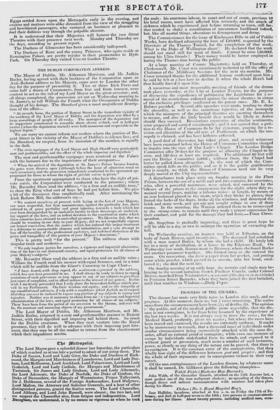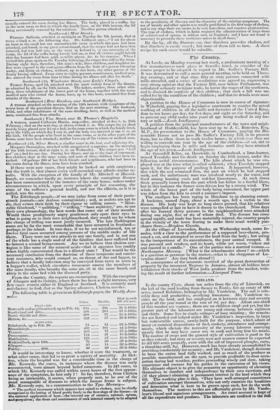PROGRESS OF THE CHOLERA.
The disease has made very little noise in London this week, and no progress. At this moment, there are but 7 eases remaining.. The entire cases from the commencement have been 55; of deaths, 53. The opinion.
the public, and of the medical public more es.pecially, that the dis- ease is not contagious, is far from being lessened by the experience of the last two weeks. It is not always easy to trace the cases ; for the Medical Board, prudently, rives TIO names ; but where the cases have been traced and examined, time results are extremely uniform. - It ought to be unnecessary to remark, that a thousand cases of individuals under similar circumstances being successively attacked with the same dis- order, afford no rational proof of contagion ; while even one instance of escape by individuals undefended from its attack, and exposed to it without guard or precaution, much more a number of such instances, prove, as clearly as any thing of the nature can be proved, that there is no contagion. It is the constant error of the contagionists, that they Wholly lose sight of the difference between post and propter ; and that the whole of their arguments are in consequence vicious in their very - outset.
Of the non-contagiousness of the London disease, by whatever name it shall be named, Dr. Gillkrest gives the following examples- Tothill Fields (Rochester Row Barrack). John Webb, of the Grenadier Guards, attacked on the 15th Jarman- last, a most perfect one of the true malignant cholera ; no spreading of the disease, though direct and, indirect communication with numbers had taken place during his illness.
Chelsea (No. 8, Royal Hospital Row). Jane Halliday, laundress, attacked at five a. m. on Friday the 17th of Fe- bruary, and died at half-past seven on the 18th; two persons in constant attend- ance during her illness. About twenty persons, including medical men, occa-
sionally entered the rooni during her illness. The body, placed in a coffin, lay in the next room to that in which the family lives, on the 19th instant, the lid being occasionally removed by the relatives. No other person attacked.
Southwark (Mint Street).
Florence Sullivan, attacked at midnight on Tuesday the 7th instant, died at
seven o'clock r. U. the following day. Dr. Gillkrest says—" I sat for about an hour in the small but not uncomfortable room in which this man had been attacked, and found, to my great astonishment, that the corpse had not been then interred, but was laid out, as the term in Ireland is, at one extremity of the room, the lid of the coffin being loosely laid on, so that all visitors aught behold
that due honours had been paid, as white gloves, &ie. to his remains. When I visited this place again on the Tuesday following, the corpse was still in the room. During eight days, therefore, this man's wife, three children, and daughter-in- law were exposed to the contagious effluvia from the body of a person labouring -under, and dying of, cholera, without, up to this hour, any other person of the family having suffered. From sixty to eighty persons, countrymen, medical men, Sic, entered the room from time to time during his illness and after his death." Southwark (18, TVinehester Street, near Lady's Chapel). Francis Byrne, aged 13, attacked with the most violent form of the disease,
as admitted by all, on the 13th instant. The father, mother, three other chil- dren, three inhabitants of the lower part of the house, together with the many medical men who visited the house, have, up to this hour, remained free from attacks of the disease.
Southwark (Bear Gardens near Southwark Bridge).
A woman attacked on the morning of 12th instant, with symptoms of the -worst form of the prevalent disease, died on the next morning. Her husband, child, and other inhabitants of the same dwelling, have, as well as the medical 2nen, continued free from attacks.
Southwark ( Vine Street, near St. Thomas's Hospital). A woman, named Catherine Harris, mop-seller, attacked at five P. al. 11th "February; died on the next day, at eleven o'clock P. :a. The corpse lay (a sheet xnerelyleing placed over it) on a bed, in the same room in which the family lived, lip to the 14th, on which day I saw it, and the body was interred at one r. M. on the 15th. Of the people who lived in the same room, or in the other parts of the louse, none have been attacked; neither have any of the visitors or medical men.
_Southwark (13, Silver Street, a similar court to the last, and adjoining it). Margaret Donoughoe, attacked with tmetpdvneal symptoms, on the morning of the 13th instant, died at eight r. al. on Wednesday. The corpse was "laid out" on a bed for one day. During her illness, and up to the time of interment, Bye children slept in the same room, and none of those children have been at- tacked. Of perhaps 100 of her Irish friends and neighbours, who had been in the room during the illness, none have been attacked.
If these were rare cases, they might be looked on with suspicion ; but the truth is, that almost every well-recorded case affords similar re-
sults. With the exception of the family of Mr. Mitchell at Mussel- burgh, we remember hardly an instance where the contagious disease has been communicated to the inmates of the same house, unless under circumstances in which, upon every principle of fair reasoning, the state of the sufferer's general health, and not the effluvia, as it it is called, was the cause. The Edinburgh people—if we may judge from some of their panic- struck journals—are zealous contagionists ; and, as zealots are apt to do, they evince their faith by their vigour in calling names. "Mise- rable falsehood," "quibbling," "trifling," "base sophistry," are, to use their own phraseology, the best words that come out of their mouths. Would these prodigiously angry gentlemen only open their eyes to
svhat is going on in their own neighbourhood, they would see by whom the charge of trifling was most justly incurred. The late Haddington
cases are by far the most remarkable that have occurred in Scotland-- perhaps in the island. In two days, if we be not misinformed, ten or twelve fatal cases occurred among persons of the middle ranks of life there. There were not two attacks in any one family, and in not one
of the whole has a single soul of all the families that have suffered had to lament a second bereavement. Are we to believe that cholera con-
tagion is like some of the mineral acids—that it operates less readily when highly concentrated than in a diluted state ? That would be the necessary conclusion from the doctrine of these temperate and consis- tent reasoners, who would compel us, on threat of fire and faggot, to believe that a deadly infection may be conveyed from town to town in a beggar's wallet, which circulates innocuous among the members of the same family, who breathe the same air, sit at the same board, and sleep in the same bed with the diseased party.
From the Country, the reports are encouraging. With the exception of Glasgow and its vicinity, where there has been a slight increase, very few cases remain either in England or Scotland. It is certainly most satisfactory to find, that as the Spring advances, Cholera recedes.
The following table is given in an Edinburgh paper, the Weekly Jour-
ENGLAND. Cases. Deaths. Died inin each 100 of Cases.
945 296 31 3-10ths Newcastle and neighbourhood, up to Feb. 16, Sunderland and ditto 5:36
2(3:73
37 8-10ths worth Shields and ditto
090
2d 5-10ths Betton, Sze seortAlen. 432 87 20 2-10ths Edinburgh, up to Feb. 20 24 15 62 5-10ths Mnsselburgh 432 191 44 2-10ths Tranent 2t,z0 77 27 5-10ths Prestonpans 115 21 18 2-10ths Eaddington 125 37 45 6-10ths Eirkintilloch, up to 19th 76 SO 39 4-10ths Glasgow 43 14 32 5-10ths Paisley 20th 30 20 66 6-10ths
It would be interesting to know, whether it were the treatment, or what other cause, that led to so great a variety of mortality. At Het- ton, where the hospital was for a considerable time in the charge of 1VIr. Kennedy, the cures, in instances where the disease was early encountered, were almost beyond belief numerous. In 241 cases, to which Mr. Kennedy was called within seven hours of the first appear- ance of the symptoms, he lost only I! So far, therefore, from Cholera being an intractable, it seems, when properly met, to be one of the most manageable of diseases to which the human frame is subject. Mx. Kennedy says, in a communication to the Tyne Mercury- " The medical treatment which appears best suited to cholera, may be chiefly comprised in the letting of blood pretty freely in the first stage of the disease—in the external application of heat—the internal use of ernetics, calomel, opium, audpargatives; the doses and continuance of each internal remedy to be adapted to the peculiarity of _the case and the character of the existing symptoms. The use of brandy and other spirits was totally prohibited in the first stage of cholera, and in any stage their use seems to be very hazardous, and requires great caution. The type of cholera, which in India required the administration of large doses of calomel and of opium, is seldom seen in England ; and I have not found it necessary to prescribe these medicines unless in small doses."
By the by, all the Doctors say, that diarrlicea precedes cholera, and that diarrhma is easily cured ; but none of them tell us how. A short recipe for such cases would be valuable.



























 Previous page
Previous page